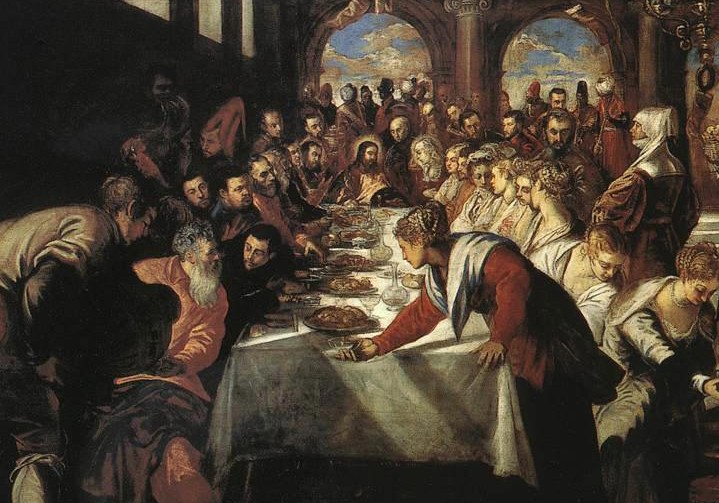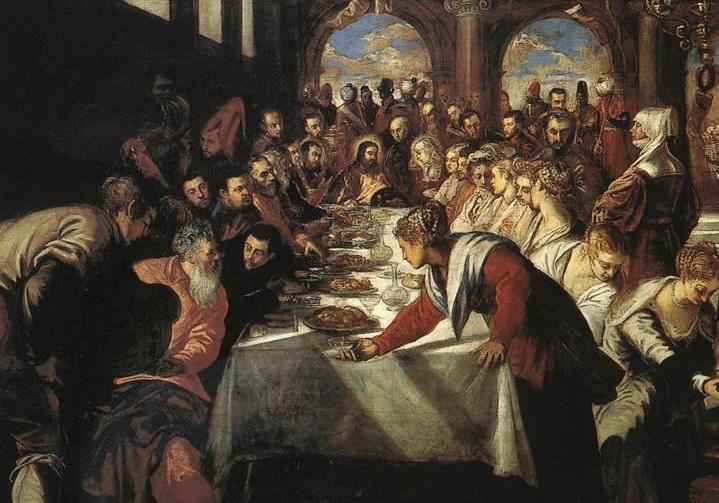在安息日,耶穌進入一個法利塞人首領的家吃飯;他們就留心觀察他。
耶穌注意到被邀請的人,如何爭坐首席,便對他們講了一個比喻,說:「幾時你被請去赴婚宴,不要坐在首席,怕有比你更尊貴的客人,也被請來,那請你而又請他的主人,要來向你說:請讓座給這位客人!那時,你就要羞愧地退到末座。
「你幾時被請,應去坐末座,等那請你的主人,走來給你說:朋友,請上坐吧!那時,你在同席的眾人面前,才有光彩。因為,凡高舉自己的,必被貶抑;凡貶抑自己的,必被高舉。」
耶穌也向請他的人說:「幾時你設午宴或晚宴,不要請你的朋友、兄弟、親戚,及富有的鄰人,怕他們也要回請你,報答你。你幾時設宴,要請貧窮的、殘廢的、瘸腿的、瞎眼的人。
「這樣,你就有福了,因為他們沒有什麼可報答你;但在義人復活的時候,你必能得到賞報。」
路加福音 14:1, 7-14
 在今天的福音中,耶穌到了法利塞人家中吃飯。那天是安息日,他們細心觀察耶穌會否做些甚麼,讓他們找到逮捕祂的理由。在新約中,基督徒一起聚餐本來應該充滿喜樂,是一個共融的時刻。但在這個宴會裡,被邀請的人忙著爭坐首席,人們互相視對方為敵人。
在今天的福音中,耶穌到了法利塞人家中吃飯。那天是安息日,他們細心觀察耶穌會否做些甚麼,讓他們找到逮捕祂的理由。在新約中,基督徒一起聚餐本來應該充滿喜樂,是一個共融的時刻。但在這個宴會裡,被邀請的人忙著爭坐首席,人們互相視對方為敵人。
耶穌留意到這情況,便以說比喻的方式教導他們。祂警告爭取上座這種行動也許帶來不能預期的消極後果,因為可能有身份地位更高的客人會來到,主人將因而要求這些原本爭得上座的人讓位,他們便會因自己的行動而導致公開的蒙羞。
接著耶穌說明受邀者先尋求末位的好處,他們不僅可避免不必要的羞辱,而且主人更會在必要的情況下,親自前來請他們登上高位,他們便可因此而得到光彩。最後耶穌提出一個顛覆世俗價值觀的結論,這個價值觀是天主的價值觀:「凡自高自大的必被貶抑,凡自謙自卑的必被高舉。」(路加福音 18:14)
耶穌也教導人們在邀請客人時所應有的態度。在當時的社會,受邀的客人們會透過回請而報答主人,主人因而失去得到更多、更大報酬的機會。耶穌建議人應該邀請無法回請的人參與宴會,因為他們將得到天主的賞報。這是耶穌對義人的許諾。
參考:
受邀者與邀請者的正確態度
On a sabbath Jesus went to dine at the home of one of the leading Pharisees, and the people there were observing him carefully.
He told a parable to those who had been invited, noticing how they were choosing the places of honor at the table. “When you are invited by someone to a wedding banquet, do not recline at table in the place of honor. A more distinguished guest than you may have been invited by him, and the host who invited both of you may approach you and say, ‘Give your place to this man,' and then you would proceed with embarrassment to take the lowest place. Rather, when you are invited, go and take the lowest place so that when the host comes to you he may say, ‘My friend, move up to a higher position.' Then you will enjoy the esteem of your companions at the table. For every one who exalts himself will be humbled, but the one who humbles himself will be exalted.” Then he said to the host who invited him, “When you hold a lunch or a dinner, do not invite your friends or your brothers or your relatives or your wealthy neighbors, in case they may invite you back and you have repayment. Rather, when you hold a banquet, invite the poor, the crippled, the lame, the blind; blessed indeed will you be because of their inability to repay you. For you will be repaid at the resurrection of the righteous.”
Luke 14:1, 7-14
In today's Gospel, Jesus had gone for a meal to the house of one of the Pharisees on a Sabbath day. The Pharisees watched Him closely to see if they could accuse Him. In the New Testament, the meals that Christians share are supposed to be moments of communion. But in this meal, the guests were busy with competing for the places of honour.
Jesus had noticed the situation and so He taught them with a parable. He warned them that this action might bring about a negative result that they could not anticipate. In case a more distinguished guest were invited, the host would request the guest to take the lowest place. He would be embarrassed in the public.
Jesus then taught them the advantage of taking the lowest place. This way not only could he avoid unnecessary embarrassment, the host might invite him to take a higher position, and in turn be honoured. Jesus gave a conclusion that goes against worldly values, which are the values in the Kingdom of God: "For everyone who exalts himself will be humbled, and the one who humbles himself will be exalted" (Luke 18:14)
Jesus also taught people whom to invite when they host a banquet. In Jewish society back then, guests would invite the host back in order to repay his favour. And the host would lose the opportunity for getting greater rewards. Jesus suggested that when people hold banquet, they should invite those who are unable to give anything in return. This way they would be rewarded by God. This is the promise Jesus made to the just.
